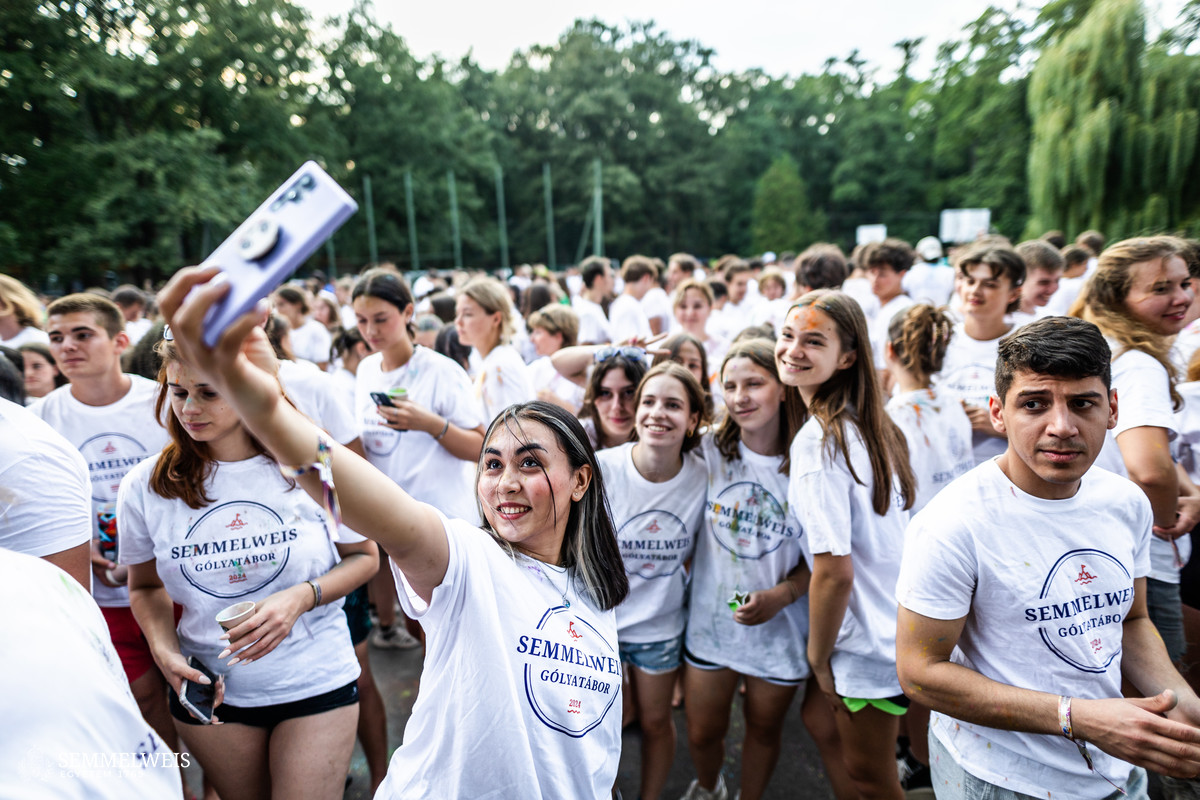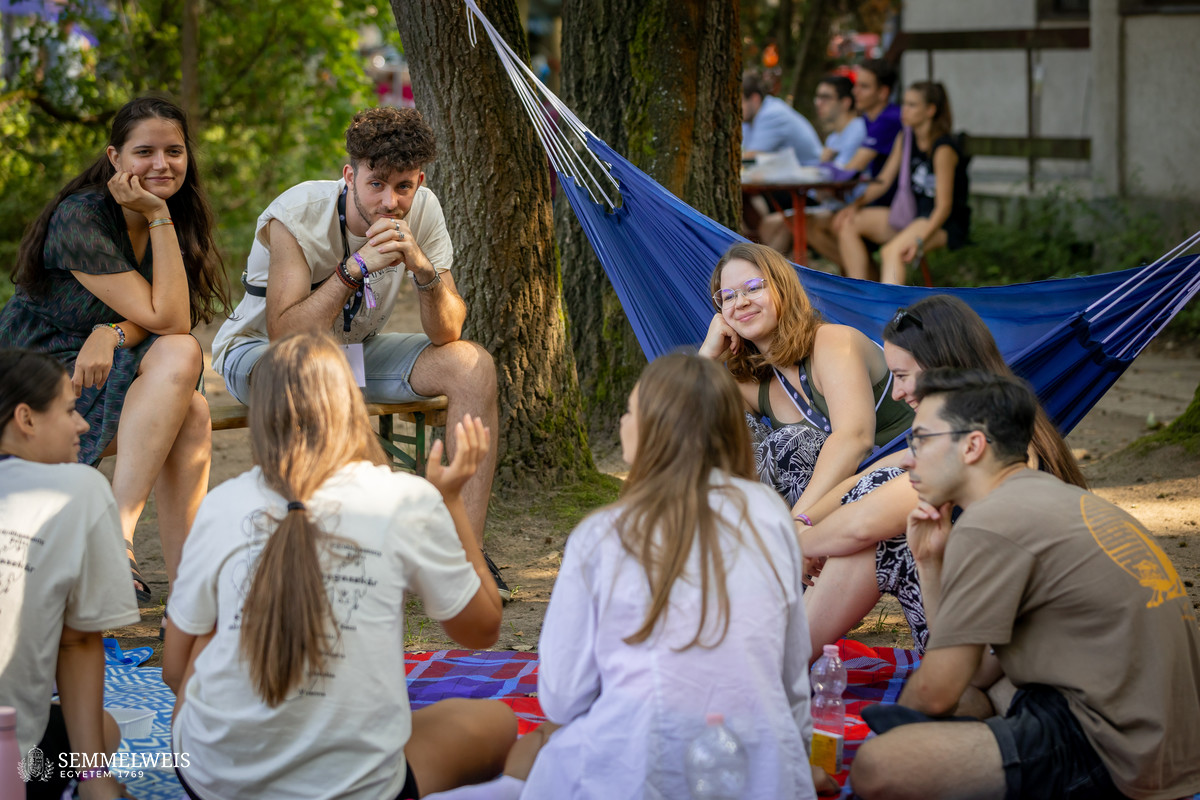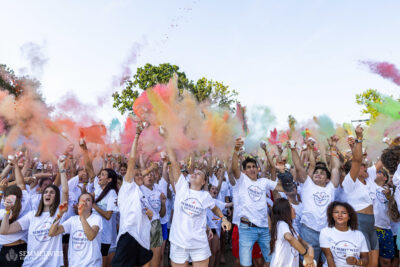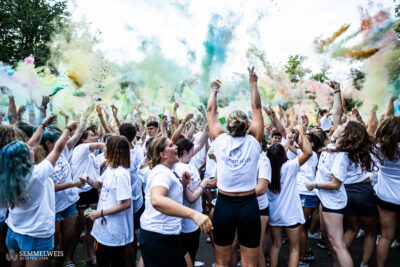The revamped Freshman Camp will be a camp preparing students for their university years, Rector Dr. Béla Merkely emphasized. As he put it, those who have been admitted to Semmelweis University have chosen one of the most beautiful professions in the world, medicine and health sciences; what is more, they can acquire the necessary knowledge at the leading university in the country and the region. “Preparing for our profession is not really comparable to training for any other occupational activity, and I make no secret of the fact that hard work awaits prospective first-year students. Semmelweis University was several times oversubscribed again this year, with most applicants in the field of medicine and health sciences wishing to study here,” the rector pointed out.
I believe we have succeeded in selecting the most talented applicants, but they also need support to be able to cope in the best possible way with the educational workload, which aims to provide them with a solid foundation. This is essential for our students to become the best professionals possible. – Dr. Béla Merkely
 The revamped Freshman Camp also serves this purpose. Unlike in previous years, it will be held after the now traditional Summer University and the opening ceremony of the academic year. Rector Dr. Béla Merkely stressed that the goal was to provide freshmen with techniques, learning methods, and practical tips that would make their first year or two easier. The rector also highlighted the camp’s role in community and team building. “The current freshmen will be studying together for many years, and, even more importantly, in the healthcare system they will also be working in teams,” the rector said, underlining the significance of teambuilding activities.
The revamped Freshman Camp also serves this purpose. Unlike in previous years, it will be held after the now traditional Summer University and the opening ceremony of the academic year. Rector Dr. Béla Merkely stressed that the goal was to provide freshmen with techniques, learning methods, and practical tips that would make their first year or two easier. The rector also highlighted the camp’s role in community and team building. “The current freshmen will be studying together for many years, and, even more importantly, in the healthcare system they will also be working in teams,” the rector said, underlining the significance of teambuilding activities.
 “The Freshman Camp has a history of more than a quarter of a century at Semmelweis University, and many valuable traditions have developed during this time, one of which is that the Rector’s Office, the Students’ Union (HÖK), and the Instructor Unprompted Group (IÖCS) jointly organize the event and welcome students to the camp,” explained Dr. Éva Szabó Feketéné, Vice-Rector for Strategy and Development. At the same time, the university’s leaders felt that it was time to organize the Freshman Camp for the students in more suitable and spacious infrastructure, which is what justified the change of location. “In addition, seeing the initial difficulties and dropout rates among students, we thought that it would be more useful to hold an introductory, preparatory event instead of a traditional freshman camp,” the vice-rector noted. “Our goal is for first-year students to learn about the university’s objectives and instructors and, above all, to support them in starting and pursuing their studies successfully in the future,” she added. For this reason, instead of the usual games, the organizers are preparing activities through which students can acquire effective learning methods, for example. On the usual Forum Day, in keeping with tradition, faculty leaders and instructors will introduce themselves, and first-year students will be able to obtain useful information from them during a question-and-answer session. A new feature compared to previous years is that the faculties can introduce themselves and their programs separately in more detail, and participants can familiarize themselves with student and sports organizations, the Semmelweis Choir, talent development programs, the services available in the Family Friendly University Program, and the mobility opportunities offered by the Pannónia Scholarship Programme.
“The Freshman Camp has a history of more than a quarter of a century at Semmelweis University, and many valuable traditions have developed during this time, one of which is that the Rector’s Office, the Students’ Union (HÖK), and the Instructor Unprompted Group (IÖCS) jointly organize the event and welcome students to the camp,” explained Dr. Éva Szabó Feketéné, Vice-Rector for Strategy and Development. At the same time, the university’s leaders felt that it was time to organize the Freshman Camp for the students in more suitable and spacious infrastructure, which is what justified the change of location. “In addition, seeing the initial difficulties and dropout rates among students, we thought that it would be more useful to hold an introductory, preparatory event instead of a traditional freshman camp,” the vice-rector noted. “Our goal is for first-year students to learn about the university’s objectives and instructors and, above all, to support them in starting and pursuing their studies successfully in the future,” she added. For this reason, instead of the usual games, the organizers are preparing activities through which students can acquire effective learning methods, for example. On the usual Forum Day, in keeping with tradition, faculty leaders and instructors will introduce themselves, and first-year students will be able to obtain useful information from them during a question-and-answer session. A new feature compared to previous years is that the faculties can introduce themselves and their programs separately in more detail, and participants can familiarize themselves with student and sports organizations, the Semmelweis Choir, talent development programs, the services available in the Family Friendly University Program, and the mobility opportunities offered by the Pannónia Scholarship Programme.
 Csenge Gecsey, Outgoing President of HÖK, said that the new program for the Freshman Camp had been in the works for about a year. In addition to the informative forums mentioned above, there will be screening programs, blood tests, and several other similar opportunities that fit into the profile of a university offering medical and health sciences education. Naturally, there will also be informal musical events for the freshmen in the evenings.
Csenge Gecsey, Outgoing President of HÖK, said that the new program for the Freshman Camp had been in the works for about a year. In addition to the informative forums mentioned above, there will be screening programs, blood tests, and several other similar opportunities that fit into the profile of a university offering medical and health sciences education. Naturally, there will also be informal musical events for the freshmen in the evenings.
 “I believe that the freshers who attend this year’s camp will start university with a clearer idea of what to expect from the outset, regardless of which faculty they have been admitted to, pointed out Orsolya Sisa, President of IÖCS. Due to the later date of the Freshman Camp, they will not be able to help with course registration in person this year, but instead they will place greater emphasis on, for example, giving first-year students advice to assist them in preparing for exam periods, or introducing them to the mentoring programs, mobility opportunities, and scholarships that are available, Orsolya Sisa said, listing a few examples.
“I believe that the freshers who attend this year’s camp will start university with a clearer idea of what to expect from the outset, regardless of which faculty they have been admitted to, pointed out Orsolya Sisa, President of IÖCS. Due to the later date of the Freshman Camp, they will not be able to help with course registration in person this year, but instead they will place greater emphasis on, for example, giving first-year students advice to assist them in preparing for exam periods, or introducing them to the mentoring programs, mobility opportunities, and scholarships that are available, Orsolya Sisa said, listing a few examples.
Instead of the usual location in Tata, this year’s Freshman Camp will be held at Lake Balaton, in Zánka, at a venue of a high standard and with a large capacity. Compared to previous years, they will be able to accommodate up to 1,200 first-year students, so fewer applications will probably have to be rejected, the organizers believe. In addition to the freshmen, approximately 350 senior students will be present as assistants representing IÖCS and HÖK, and roughly 80 lecturers will also attend the event. The university’s own security staff will ensure the safety of the participants, while medical care and services will be provided by the university’s ambulance service.
Freshmen can move into the Zánka Sports and Event Center in early September. According to the organizers, one important advantage of the later date compared to previous years is that they will be able to host more international students than usual as they are very likely to be in Hungary by the time of the opening ceremony of the academic year. A personalized international educational program is being prepared for them, drawing on previous experience to include elements that can be truly useful for them. International student organizations, Vice-Rector for International Studies Dr. Alpár Alán, and the Center of International Training Programs all assisted the organizers in developing this.
Student representatives from the International Semmelweis Student Association (ISSA) and the Deutschsprachige Studentenvertretung Semmelweis (DSVS) will also be present at the Freshman Camp to provide guidance and information to international students. The liaison and support organizations of the English and German-language programs, respectively, warmly welcome international students if they need any help or advice during their stay in the camp.
Those interested can apply for this year’s Freshman Camp on the revamped website. In addition to applying, students can also pay the registration fee (camp fee) conveniently and find further important information about the event.
Eszter Keresztes, Pálma Dobozi
Translation: Dr. Balázs Csizmadia
Photos by Bálint Barta, Attila Kovács, Boglárka Zellei – Semmelweis University




